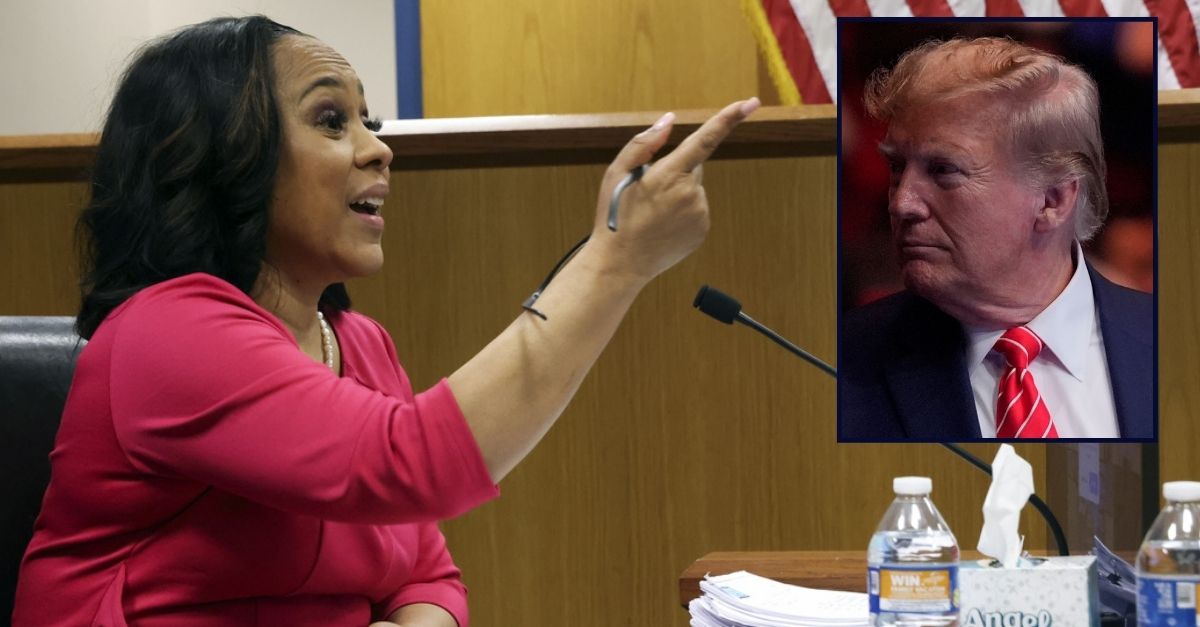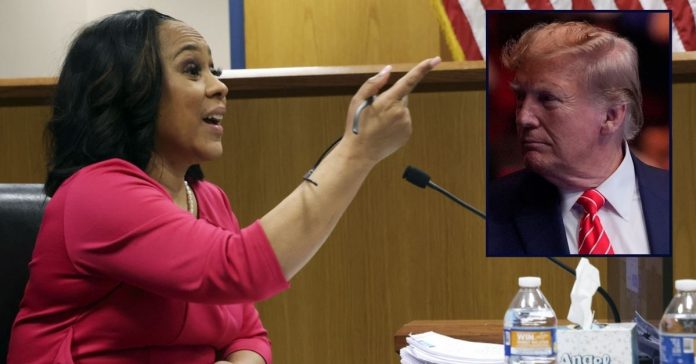
Main image: Fulton County District Attorney Fani Willis testifies during a hearing on the Georgia election interference case, Feb. 15, 2024, in Atlanta. (Alyssa Pointer/Pool Photo via AP); Inset right: Former President Donald Trump waits for the start of a UFC 299 mixed martial arts bout, March 10, 2024, in Miami. (AP Photo/Wilfredo Lee)
Fulton County District Attorney Fani Willis has asked an appeals court not to consider former President Donald Trump’s latest effort to have her removed from his racketeering (RICO) and election subversion case.
On Monday, the district attorney filed a 19-page reply brief asking the Georgia Court of Appeals to turn down a defense effort seeking a review of the trial court judge’s recent decision to keep her in charge.
“There being no error by the trial court, the present application merely reflects the applicants’ dissatisfaction with the trial court’s proper application of well-established law to the facts,” the state’s filing reads. “Because the applicants have wholly failed to carry their burden of persuasion, this Court should decline interlocutory review.”
The defense has been angling to have Willis and her office removed from the case since January — initially over allegations that her romantic relationship with now-former lead prosecutor Nathan Wade created a conflict of interest due to pecuniary motives.
On March 15, Fulton County Superior Court Judge Scott McAfee partially granted the defense motion to disqualify but gave the prosecution the choice of which prosecutor had to go. The court’s order was based on a finding that the one-time romance between Willis and Wade resulted in “a significant appearance of impropriety that infects the current structure of the prosecution team.” Wade resigned hours later.
Now, the defendants insist the trial court’s method of separating the legal issues was “plain legal error requiring reversal” — while basing their interlocutory appeal on the factual record McAfee established.
Willis, however, argues the factual record is actually on her side.
“[T]here was a factual basis for the trial court’s well-explained rulings, and the applicants’ insistence that error occurred amounts to no more than disagreement with the trial court’s assessment of those facts,” the state filing reads. “Dissatisfaction with factual findings is not a basis for the grant of an appeal or the reversal of a trial court’s order, and the application should be denied.”
In the end, McAfee said the defense had not met its burden to show Willis obtained “a material financial benefit as a result of her decision to hire” Wade — or that the “financial gain flowing from her relationship” motivated Willis to prosecute and prolong the case.
The appeal application itself is premised on “forensic misconduct” allegations against Willis over her Martin Luther King Jr. Day speech at Big Bethel A.M.E. Church in Atlanta — a speech that, the defense argued, was a direct public response to the nepotism allegations.
Willis notes that the defense does not take issue with McAfee’s factual findings — just how he applied those facts to relevant law.
“[T]he trial court found that the District Attorney’s public comments concerned either the office’s conviction rates; the charges in the indictment; the procedural posture of the case; the need for or importance of the investigation; or personal anecdotes,” the state’s brief reads. “Insofar as the District Attorney delivered a speech at a local church, the trial court concluded the speech did not ‘cross the line’ because it failed to name any defendant; it did not disclose sensitive or confidential evidence; it did not address the merits of the indicted offenses to move the trial to the court of public opinion; and further, the case is too far removed from jury selection for any actual prejudice or improper effect on the jury pool to actualize.”
The defense, however, claims the district attorney’s church speech contained “inflammatory extrajudicial racial comments” about the defendants and improperly stoked “racial animus” to influence would-be jurors in retaliation for, and in order to deflect from, the allegations raised in the motion to disqualify. Their appeal cites McAfee’s own withering estimation of the speech in which the trial court criticizes Willis for using the speech “to cast racial aspersions at an indicted defendant’s decision” over the disqualification motion.
Willis shrugs away those concerns in a footnote:
The trial court noted the District Attorney’s comment that individuals were “playing the race card” and her references to the different races of three special prosecutors. Although the trial court found that “the effect” was to “cast racial aspersions” at the decision to file the motion to disqualify, it is no surprise the court still found no basis to disqualify the District Attorney. Factual passing references to the various races of members of a prosecuting team are hardly the type of egregious commentary contemplated by [case law] to warrant disqualification. And a comment suggesting individuals were “playing the race card” is too vague, brief, and limited in scope to imply any defendant harbored racial prejudice, particularly to the point of requiring disqualification.
In declining to toss the district attorney, the trial court said the case was simply too far away from trial for a potential jury pool to have been tainted by the church speech — but did suggest the defense would be well within their rights, and likely to succeed, should the defendants base a gag order request on the speech.
The defense claims the trial court erred in a big way — a constitutional due process violation — when McAfee made the “erroneous failure” not to disqualify Willis, and her office, from the case.
Willis, again, argues the lower court got it right — and that there is just no need for the appellate court to even consider the case.
“There is simply no trial court error to be found in the decision to deny disqualification,” the state’s brief continues. “Days of evidence and testimony failed to disclose anything like a calculated pre-trial plan designed to prejudice the defendants or secure their convictions. The applicants have not identified any public statement injecting the District Attorney’s personal belief as to the defendants’ guilt or appealing to the public weighing of evidence.”
Additionally, the defense claims Willis made a “false statement” in a court document and later lied under oath about her relationship. That was also forensic misconduct, the defendants say, and the judge — who strongly intimated that Willis was not truthful when forced to account for her eventually acknowledged relationship with Wade — again failed by not using those alleged lies as the basis to disqualify.
“[A]n odor of mendacity remains,” the judge opined. “[R]easonable questions about whether the District Attorney and her hand-selected lead SADA testified untruthfully about the timing of their relationship further underpin the finding of an appearance of impropriety and the need to make proportional efforts to cure it.”
Willis elides the trial court’s criticism by noting that McAfee did not, in fact, outright accuse her of lying to cover up the affair.
“The trial court’s order evinces that the judge carefully considered the District Attorney’s and Wade’s testimony, but the court made no factual finding of false testimony or a false affidavit,” the state’s brief goes on. “In requesting a contrary finding on this issue, the applicants would have this Court invade the province of the trial court and make additional factual findings. This it cannot do. Because interlocutory review is clearly not permissible on this ground, this argument should be rejected.”
Have a tip we should know? [email protected]

